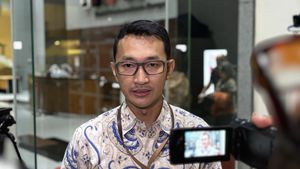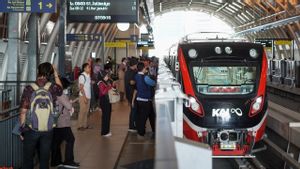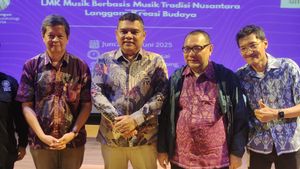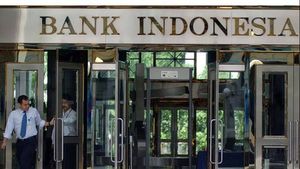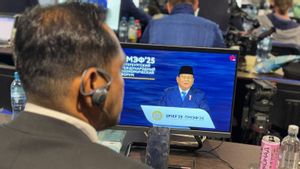JAKARTA - The regional elections were immediately held. Among the results that attracted attention were the win of the Blank Box against the incumbent candidate in the Pilkada of Pangkalpinang City, Bangka Belitung. In quick calculations, the empty box won 60% against the sole candidate Maulan Aklil-Hakim. Defenders of Kotak Blank offered their thanks for this result.
The reform era in Indonesia was marked by an improvement in the quality of democracy that was better than the New Order era. One form of effort to improve the quality of democracy is the implementation of general elections that involve the people directly to contribute to policy determination.
The application of the concept of decentralization in Indonesia makes each region have the autonomy to regulate and take care of regional household affairs, including in terms of general elections for regional heads.
The election of regional heads, or known as Pilkada, is a democratic mechanism that is carried out to elect regional leaders. In this case, the people are directly involved by being given the right and freedom to choose candidates who compete in political contestation.
Pilkada is not only a regional head election contest, but also a manifestation of people's political participation in determining the direction and policy of regional development. Pilkada is a vital means to realize healthy and sustainable democracy.
This year there is something very different in organizing the regional elections in Bangka Belitung. For the first time in this province, there is a single candidate who fights the Blank Box in three districts/cities in Bangka Belitung.
The three regions that have a single candidate include South Bangka Regency, Pangkalpinang City, and Bangka Regency.
When viewed from Indonesia's history, the phenomenon of empty boxes first emerged when the Constitutional Court issued a decision that provided an alternative to adding empty boxes as a single candidate against the 2015 Pilkada. This phenomenon then continues to repeat itself in the following periods, including the most occurring in 2024.
When viewed from the context of democracy, the phenomenon of a single candidate who fights an empty box in the election can be seen through two perspectives. First, this phenomenon can be seen as a failure of the democratic system in Indonesia because it has a negative impact on the future of democracy, which is reflected in the lack of competition rates and limited choices for the community to gain a potential leader for their regions.
Second, the phenomenon of a single candidate against this empty box shows that there is a large coalition, in which the parties form a coalition, thus providing very little space for other candidates to advance.
It is feared that the existence of a single candidate supported by many parties will create centralized power so that there is no opposition that functions as a balancer of power and policy critics that will be issued by the government. In fact, in every government that implements a democratic system, the opposition is the most important part in order to have two sides that balance and produce decisions and policies that really prioritize the interests of the people.
According to Merilee S. Grindle in her work entitled Local Governments that Perform Well: Four Explantations, there are four criteria that can be a benchmark for the success of government at the regional level
First, the Competitive Elections, which emphasizes that the ideal condition of the regional elections that can produce leaders that suit the needs of the regional community is the regional elections with stiff competition that many pairs of candidates participate in. Strict competition in this political contestation can produce leaders that are truly needed and desired by the community.
Second, the Public Sector Entrepreneurship, which emphasizes the importance of having a regional leader with a high entrepreneurial spirit who can optimize all the potentials that exist within him and take advantage of existing opportunities, so as to improve performance in mobilization, coalition, and the ability to make strategic choices, and can also face community opposition, apathy, or capacity constraints.
Third, the Public Sector Modernization, which relates to the urgency of the transformation of government organizations at the local level. This emphasizes the need for new ideas and training for public officials at the local level to provide stimulus for changes in the performance of local governments.
Fourth, the Civil Society Activism, which explains that in order to create a good regional government, a social group of people is needed that can put pressure on the government to provide better services and provide opportunities for the community to participate in the public policy process that prioritizes the interests and needs of the community.
Avoid Cartelization
Bangka Belitung, as an archipelagic region with enormous natural resource potential, has for years relied on the mining sector as the main source of income.
Now, this area is focusing on the post-exploitation era (post-extractivism) by leaving the mining sector as the main livelihood and switching to sustainable development.
Therefore, Bangka Belitung requires a visionary leader, competent, and has qualifications and skills that can represent the interests of society as a whole.
In this case, the pilkada should be a competitive political contestation because this local electoral celebration is a key element in a decentralized system that has an important role to play in ensuring that the government at the local level runs democratically, representatively, and is oriented towards the needs of the people.
The existence of serious challenges against local democracy in Bangka Belitung Province requires concrete steps to address negative implications for community legitimacy and weakening decentralization.
In this case, a combination of regulatory reforms is needed by adjusting the nomination support threshold which can be in the form of a reduction in the minimum threshold for political party support in order to encourage more alternatives to enter the contestation.
Strengthening political literacy between the community and the civil society or civil society is also very important to overcome the negative implications of this phenomenon so that election education and democratic education are needed for the people and involve civil society organizations to educate the public about their rights and responsibilities in the democratic process.
In addition, restructuring or reforming political parties to avoid cartelization is an important point. In this case, it is necessary to strengthen the party's internal democracy which can ensure that the selection process for candidates within the party is transparent, competitive, and involves the best cadres, increase the financial accountability of the party to prevent the influence of single candidates who are financially strong, and encourage political parties to carry alternative candidates who have different backgrounds, including young and female cadres.
Using a holistic approach, this phenomenon can be transformed into an opportunity to improve the quality of local democracy and encourage wider political participation.
These steps will not only strengthen the legitimacy of the elected regional head, but also ensure that decentralization runs according to its original goal, namely improving people's welfare through inclusive and participatory governments. (between / various sumbr)
The English, Chinese, Japanese, Arabic, and French versions are automatically generated by the AI. So there may still be inaccuracies in translating, please always see Indonesian as our main language. (system supported by DigitalSiber.id)



